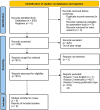Large language models for generating medical examinations: systematic review
- PMID: 38553693
- PMCID: PMC10981304
- DOI: 10.1186/s12909-024-05239-y
Large language models for generating medical examinations: systematic review
Abstract
Background: Writing multiple choice questions (MCQs) for the purpose of medical exams is challenging. It requires extensive medical knowledge, time and effort from medical educators. This systematic review focuses on the application of large language models (LLMs) in generating medical MCQs.
Methods: The authors searched for studies published up to November 2023. Search terms focused on LLMs generated MCQs for medical examinations. Non-English, out of year range and studies not focusing on AI generated multiple-choice questions were excluded. MEDLINE was used as a search database. Risk of bias was evaluated using a tailored QUADAS-2 tool.
Results: Overall, eight studies published between April 2023 and October 2023 were included. Six studies used Chat-GPT 3.5, while two employed GPT 4. Five studies showed that LLMs can produce competent questions valid for medical exams. Three studies used LLMs to write medical questions but did not evaluate the validity of the questions. One study conducted a comparative analysis of different models. One other study compared LLM-generated questions with those written by humans. All studies presented faulty questions that were deemed inappropriate for medical exams. Some questions required additional modifications in order to qualify.
Conclusions: LLMs can be used to write MCQs for medical examinations. However, their limitations cannot be ignored. Further study in this field is essential and more conclusive evidence is needed. Until then, LLMs may serve as a supplementary tool for writing medical examinations. 2 studies were at high risk of bias. The study followed the Preferred Reporting Items for Systematic Reviews and Meta-Analyses (PRISMA) guidelines.
Keywords: Artificial intelligence; Generative pre-trained transformer; Large language models; Medical education; Medical examination; Multiple choice questions.
© 2024. The Author(s).
Conflict of interest statement
The authors declare no competing interests.
Figures



References
-
- GBD 2019 Human Resources for Health Collaborators. Lancet. 2022;399(10341):2129–54. 10.1016/S0140-6736(22)00532-3. Measuring the availability of human resources for health and its relationship to universal health coverage for 204 countries and territories from 1990 to 2019: a systematic analysis for the Global Burden of Disease Study 2019. - PMC - PubMed
Publication types
MeSH terms
Grants and funding
LinkOut - more resources
Full Text Sources
Miscellaneous

